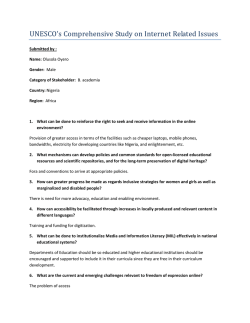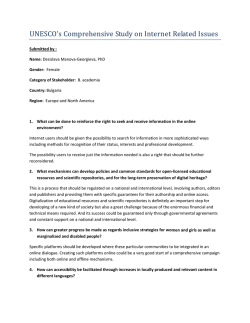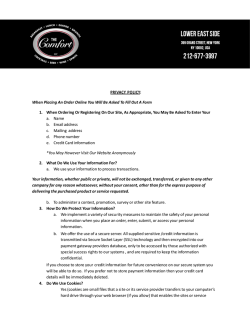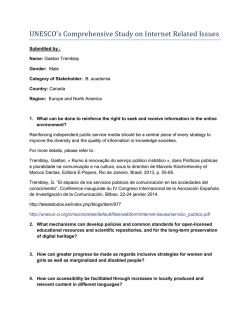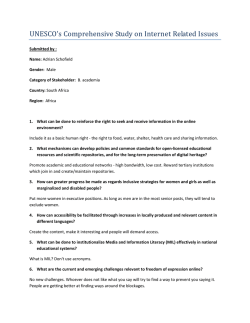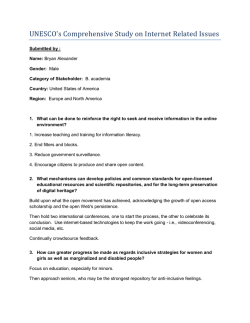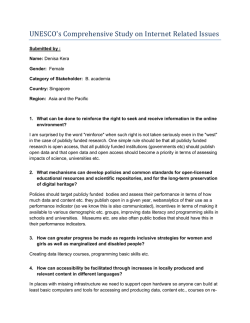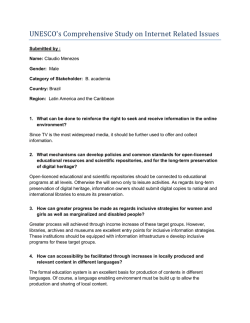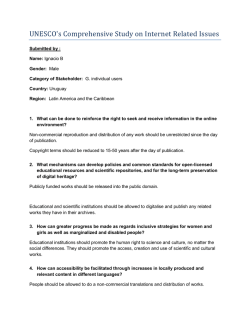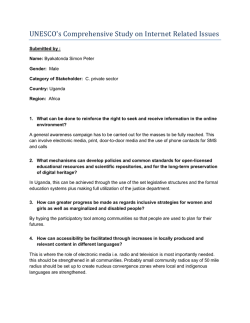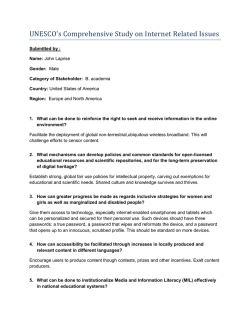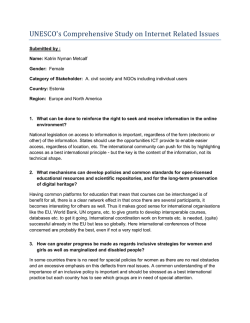
Poncelet Ileleji
UNESCO's Comprehensive Study on Internet Related Issues Submitted by : Name: Poncelet Ileleji Gender: Male Category of Stakeholder: A. civil society and NGOs including individual users Country: Gambia Region: Africa 1. What can be done to reinforce the right to seek and receive information in the online environment? What is to be done is to increase access taken it to the last mile especially broadband in a lot of developing countries especially in Africa its still an issue. With increase access people can then have a choice to get information they require. In my continent of Africa especially in West Africa my region more has to be done in terms of local content and diversity in terms of Language, we lack enough local content within our context to serve our communties, what might suit A in Country Y in the West might not suite B in country Z in the 2. What mechanisms can develop policies and common standards for open-licensed educational resources and scientific repositories, and for the long-term preservation of digital heritage? The need for more content creation and more collaborative projects involving educationalist, technologist is important to create a strong and fruitful repository for OER. The more availability the better. 3. How can greater progress be made as regards inclusive strategies for women and girls as well as marginalized and disabled people? In a lots of parts of the world to me personally its to get women in rural areas, who need access to information regarding to subsistence farming, health and other information etc that suits their needs to be able to be educated through on the role internet can play in their lives, with smart phones getting cheaper through universal access funds that countries are adopting and NGO's working in technology such projects can be set up to make not only women and girls including special needs to get access to this information but also youths in these communities. 4. How can accessibility be facilitated through increases in locally produced and relevant content in different languages? As access becomes improved in our schools systems worldwide especially in developing countries, the need is to start creating content that will suit the needs of the communities, some of these content might have to be voice enabled only apps etc, but the onus lays on us within the domain of content creation to make this happen to suit the needs of communities. 5. What can be done to institutionalize Media and Information Literacy (MIL) effectively in national educational systems? Pilots have to be done in certain countries especially in Africa through the various Ministries of Education when the policy folks see how effect MIL is its can be easily institutionalized. 6. What are the current and emerging challenges relevant to freedom of expression online? in my opinion the main challenges is regulation across all levels, A good example of this was the publication online of the beheading of American journalist in Syria by IS, James Foley, it brought about a lot of issues, first why are content platforms accepting all kinds of content, yes its freedom of information, but some are hate crimes, terrorism related etc, content platforms, to me should be able to self regulate and if now authorities like the Metropolitan Police in the United Kingdom issued a warning watching the video of the beheading of James Foley was a crime, what freedom is there, people access what is available hence the need for self regulation across all board. 7. How can legislation in a diverse range of fields which impacts on the Internet respect freedom of expression in line with international standards? As long as we respect the Internet is open and there exist a common dialogue at all times through Internet Governance forums from national to global level with all stakeholders having equal footing, then at national level legislation in a diverse range of fields can not easily affect Internet freedoms. The need to strengthen the internet governance processes at country level, then regional blocs helps create a better opportunity to make this happen. 8. Is there a need for specific protections for freedom of expression for the Internet? To a large extent yes, but when it involves terrorism, and stuff that affects children, hate crimes online their has to be a line to be drawn and to me that's where self regulation comes to play. 9. To what extent do laws protect digitally interfaced journalism and journalistic sources? My knowledge about this area is quite limited 10. What are the optimum ways to deal with online hate speech? How can Media and Information Literacy empower users to understand and exercise freedom of expression on the Internet? The need is self regulation again, even to the individual and to the content platforms that this occurs, more strict user policies should be in place. 11. What are the optimum systems for independent self-regulation by journalistic actors and intermediaries in cyberspace? This depends on the context of where it is applicable, yes the Internet has no boundaries but what laws offline that are applicable have still been used to address issues online 12. What principles should ensure respect for the right to privacy? The principles of users to know their rights and privacy of data to be respected 13. What is the relationship between privacy, anonymity and encryption? Its all a symbiotic relationship to me as they are all related within the context of how used because at the end of the day you want privacy rights respected. 14. What is the importance of transparency around limitations of privacy? Its important so users know exactly what they get into when signing into any platform to use it, content platforms have to be clear on these issues. 15. What kinds of arrangements can help to safeguard the exercise of privacy in relation to other rights? THis has to be done through a will defined communication strategy especially for young people so they learn and know about their privacy in respect to other rights. 16. How can openness and transparency of data be reconciled with privacy? This depends on the context its applied, as many situations differ, we have to really differentiate well when it comes to Openness and Transparency in relation to privacy. 17. What may be the impact of issues relating to big data on respect for privacy? What people do know. about "Big Data", as its complex sets of data, depending on usage privacy issues will definitely come into play, that's where openess is important for such. 18. How can security of personal data be enhanced? Through more users knowing their rights to privacy and this can be done effectively through use of more sicial medium networks to educate users especially young people who are the most vulnerable on these. 19. How can Media and Information Literacy be developed to assist individuals to protect their privacy? We can develop curricula out of Media and Information Literacy that can be taught at schools as part of a Life Skill, as we live in a digital enabled world today. 20. How can ethical principles based on international human rights advance accessibility, openness, and multi-stakeholder participation on the Internet? This has to be done through various mediums and avenues where internet governance is discussed starting from national level young people have to be fully involved too. 21. What conceptual frameworks or processes of inquiry could serve to analyse, assess, and thereby inform the choices that confront stakeholders in the new social uses and applications of information and knowledge? The main process to me is what is Acceptable? However this varies based on the context, hence its not a pne cap fits all approach, hence the need for consensus and dialogues when these occur. 22. How does ethical consideration relate to gender dimensions of the Internet? It relates in a lot of ways based on the context of where on the Internet? So the where determines when gender dimensions can come to play. 23. How can ethics, - i.e. the simultaneous affirmation of human rights, peace, equity, and justice - inform law and regulation about the Internet? 24. What international, regional and national frameworks, normative guidelines and accountability mechanisms exist of relevance to one or more fields of the study? Internet Governance Forums 25. How do cross-jurisdictional issues operate with regard to freedom of expression and privacy? This is based on what applies offline can apply online too based on the context of use. 26. What are the intersections between the fields of study: for example, between access and freedom of expression; ethics and privacy; privacy and freedom of expression; and between all four elements? The insertions focuses on privacy across board, once that is respected then we all in sync. 27. What pertinent information materials exist that cut across or which are relevant to the four fields of the study? The Diplo foundation through its various capacity building programs on Internet Governance has loads of materials related to this. 28. What might be the options for role of UNESCO within the wider UN system in regard to the distinct issues of online Access to information and knowledge, Freedom of Expression, Privacy and Ethical dimensions of the information society? UNESCO more advocacy and understanding of these issues within the UN Portals this easily UNESCO can do. 29. What might be options for the role of UNESCO in relation to stakeholders outside the UN system? 30. For each study field, what specific options might UNESCO Member States consider? UNESCO to me as a global player and respected UN body that works in all countries should be fully engaged in National Internet Governance forums, this is a place they can help alot, educate and bring issues pertinent to online Access to information and knowledge, Freedom of Expression, Privacy and Ethical dimensions. The issue of capacity building working with stakeholders is important here too.
© Copyright 2026
